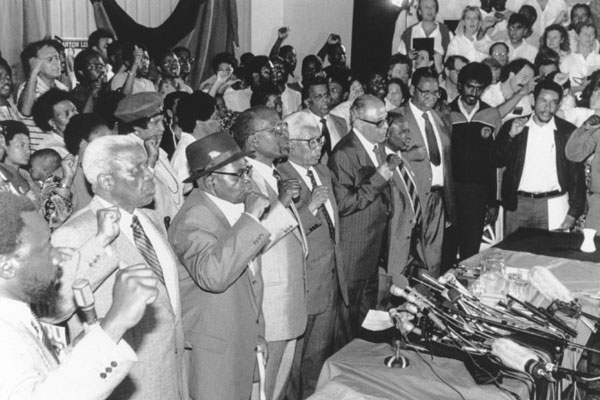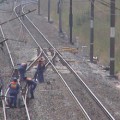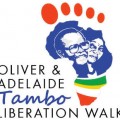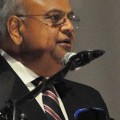When a young political prisoner named Mac Maharaj smuggled the manuscript of Nelson Mandela’s biography Long Walk to Freedom out of Robben Island in 1970s, little did anyone know that manuscript would become a cogent part of the history of South Africa.
When Nelson Mandela was released from prison, the book went on to be read by millions around the world and brought the attention of its readers to the man who would later become the first black President of South Africa. The book has now been converted into a film which is being released in cinemas across South Africa. After he left Robben Island, Maharaj successfully ensured that the manuscript was transported out of the Island and all the way to London where the secret files were to be delivered into the safekeeping of a trusted friend. How ironic that Mandela appointed Maharaj the Minister of Transport when the first cabinet was announced in 1994!
This story and others were shared in Pretoria recently as South Africa marked the 50th anniversary of the 1964 Rivonia Treason Trial, in which ten leaders of the African National Congress (ANC) were tried for 221 acts of sabotage to overthrow the apartheid system. The anniversary was held at the Palace of Justice in Pretoria, where the actual trial took place 50 years ago.
As he re-lived that crucial moment of our history, Maharaj told an audience of about 100 people, who attended the anniversary, that the Rivonia trial was one of the most important parts in South Africa’s history and struggle for freedom.
“Here we are, celebrating the 50 years of the Rivonia trial. I always think of myself as a very young man. Certainly I was young at that time but when you realise it’s been 50 years you see that you are no longer young. Our call to South Africans is never to forget what this history brought us. It was a very important time in our country,” he says.
“There had been many trials in that march to freedom but there are two trials that stick out in my mind as highly celebrated trials and they are the Reichstag fire trial in Nazi Germany…and the Rivonia trial.”
Maharaj challenged South Africans to interrogate and probe the events that had led to the trial and to learn something from them.
“Today we try to look at the trial in different angles to see what makes it significant and it is such events like celebrating this anniversary that keep reminding us of our important history. We should continue to do so as it reminds us of not only where we come from, but of the work that still needs to be done.”
While Maharaj spent only 12 years in prison, others like former President Nelson Mandela, Raymond Mhlaba, Walter Sisulu, Ahmed Kathrada and Andrew Mlangeni were not as fortunate.
SAnews spoke to Kathrada and Mlangeni, who both spent more than 26 years on Robben Island.
Like Mandela and other political prisoners, Kathrada and Mlangeni knew that the government freeing them meant a free South Africa. So when they were eventually released in 1989 after 26 years of incarceration, they knew their freedom would mark a new beginning in South African politics, one that ushered in an era of hope for many.
Nelson Mandela’s freedom, a year after Kathrada and Mlangeni, saw the unbanning of the ANC everyone knew. It was just a matter of time before the government could surrender and bring the shameful segregation system to an end.
But for Kathrada, (or ‘Kathy’, as he is popularly known), the negotiations that followed in 1990 proved to be as tough for the comrades as was trying to convince white authorities of their innocence in 1964.
And when 1994 came and thousands of South Africans went out to cast their vote on 27 April, one can only imagine what went through the minds of these men.
“The main achievement in 1994 was to have that right to choose who should govern you. Before then, all of us who are not white were treated as lesser human beings, without dignity. But what 1994 brought for the first time for us was dignity,” says Kathrada.
Quite a forgiving statement for one who narrowly escaped the gallows!
“Jail is very difficult. Nobody can say jail it is easy but there was always that knowledge that while you are suffering, you are protected. No policeman will come and start shooting at us and it was our comrades outside prison who were at the coalface of the struggle, waging a war.
“One can have all the wealth in the world, but if you don’t have dignity you can’t be a fully functioning human being.”
Although he has been very calm throughout the interview, there’s a noticeable change in Kathrada’s tone and he gets a little irate when I ask him what he thinks of young people who don’t see a reason to vote.
He feels strongly that while South Africa is still faced with many challenges such as poverty and unemployment, 1994 brought many material gains and life, according to Kathrada, has improved significantly for many South Africans.
“When you vote, you choose a government that you believe will address your needs. I believe it is silly to say you will not vote for one reason or the other. It is silly.
“There are many things that we can be proud of. More than 2.5 million houses have been built, over 80 percent of those houses are electrified and water is available in the majority of houses.”
While noting the progress made since 1994, Kathrada lays emphasis on the fact that while 20 years is probably a lot in the life of a human being, it’s not much in the life of a nation.
“We have got challenges ahead of us. The challenge is no more apartheid, the main challenges are hunger, poverty and unemployment, disease, education, health – those are our challenges.”
Kathrada has published three books. In 1999, he published Letters from Robben Island; in 2004, he published Memoirs and in 2005 he published A Free Mind: Ahmed Kathrada’s Notebook from Robben Island.
This veteran says the end of the second decade off freedom presents an ideal opportunity to mobilise society to tackle these challenges.
“The message young people need to know is that with freedom, comes responsibility. They have a responsibility to their parents and the country. Their responsibility is to take advantage of the universities that we have because we are short of skills.
“If young people don’t take part in the democratic process of the country and the future goes wrong, they are going to be blamed. So it is their responsibility to vote. It’s in their own interest and that of their children. They have to vote,” he emphasises.
For veteran Andrew Mlangeni, the strides made in the last nineteen years of democracy in the country ought to be celebrated more.
For this trialist, who is the patron of the June and Andrew Mlangeni Foundation, which supports charity work, it seems retirement is not an option. The 87-year-old has been a Member of Parliament since 1994. For him, as he puts it, it is a service to the nation, more than a duty.
“We have done a great deal to ensure that we change the situation of our people and that we ensure equality for all – black and white. In the last 19 years of our democracy, a lot has been done and some people don’t realise that,” says Mlangeni.
“One should never apologise for the fact that several millions of houses have been built since 1994 and tap water and sanitation is available to many… there are challenges no doubt but there are successes too.”
However, he is quick to raise concerns about the structure of the economy of the country which he says is limiting the growth of the previously disadvantaged groups.
So what should be done to undo the economic imbalances? Mlangeni reckons the strategy should be ensuring that the economy grows and amendments are made to laws that seek to address economic imbalances of the past.
“It’s a challenge. And another issue is that our population is growing faster than the economy and we are unable to address the issue of unemployment at a reasonable speed,” he says.
As I left that momentous occasion, I could not help but feel infected with the vigour, passion and courage those veterans had 50 years ago. And in all of them, that spirit still lives on. – SAnews.gov.za








